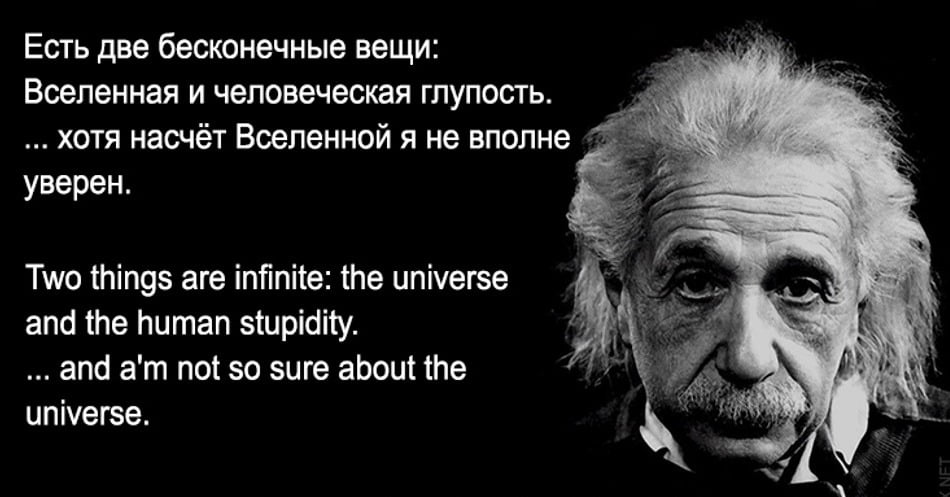The famous scientist is often credited with saying that human stupidity has no limits. We checked whether this attribution is correct.
As a statement by Einstein, this phrase in slightly different formulations can be found on sites with collections of quotes, in particular “Quotes.info", City.net, Socratify.net And "Great words" It is published by popular public pages in "VKontakte", as well as users Facebook, Twitter, Instagram, "Yandex.Zena" and other social networks and blogging platforms.
By data portal The Quote Investigator, the earliest mention of this phrase in printed sources is a book by a psychiatrist, founder Gestalt therapy by Fredric Perls, Ego, Hunger and Aggression: A Revision of Freud's Theory and Method (1942).
The phrase we are interested in meets in this context: “This impatient, greedy attitude, more than anything else, is responsible for the extreme stupidity we see in the world. Just as people do not have the patience to chew real food, they do not take enough time to “chew” spiritual food. Since these times greatly encourage hasty eating, it is not surprising that one great astronomer said: “Two things are infinite as far as we know: the universe and human stupidity.” Now we know that this statement is not entirely correct. Einstein proved that the Universe is finite."
As you can see from this passage, the quote was originally attributed to a “great astronomer,” and Einstein is mentioned in a subsequent qualifying sentence. Moreover, in his later works, published after death physics in 1955, Perls begins to name Einstein as the author of the phrase. For example, in 1969, a psychiatrist writes: “As Albert Einstein once told me: “Two things are infinite: the universe and human stupidity.” Then, in another text, an expanded version of the phrase appears, which has become especially popular on social networks: “Two things are infinite: the Universe and human stupidity - and I’m not quite sure about the Universe yet.”
Moreover, very similar expressions can be found in texts that appeared before Perls's book. In a 1915 magazine is given Quote from the French philosopher Ernest Renan: “It is not the stars that give the idea of infinity, but the stupidity of man.” At the same time, Renan's statement meets in different versions and is not found in his own texts, so here too we may be dealing with a false attribution. In 1880, Guy de Maupassant in the book Des Vers published quote from a letter by Gustave Flaubert: “The earth has its limits, and human stupidity is limitless!”
So, with a high degree of confidence, we can say that it was Perls who attributed the phrase to Einstein. Moreover, in his 1942 text, the statement of the “great astronomer” and the name of the physicist are simply mentioned side by side, and almost three decades later, Einstein is already listed as its author. Note that in later texts Perls begins to refer to a personal conversation with the scientist, while in no other sources the phrase is mentioned as a quote from Einstein. Most likely, the psychiatrist was let down by his own memory, in which over almost 30 years the phrase “great astronomer” turned into the words of a great physicist, and was supplemented by a clarification about uncertainty about the boundlessness of the Universe.
Incorrect quote attribution
- The Quote Investigator. Two Things Are Infinite: the Universe and Human Stupidity
- K. Dushenko. History of famous quotes
- Did Einstein say: “The greatest folly is to do the same thing and hope for a different result”?
If you find a spelling or grammatical error, please let us know by highlighting the error text and clicking Ctrl+Enter.






